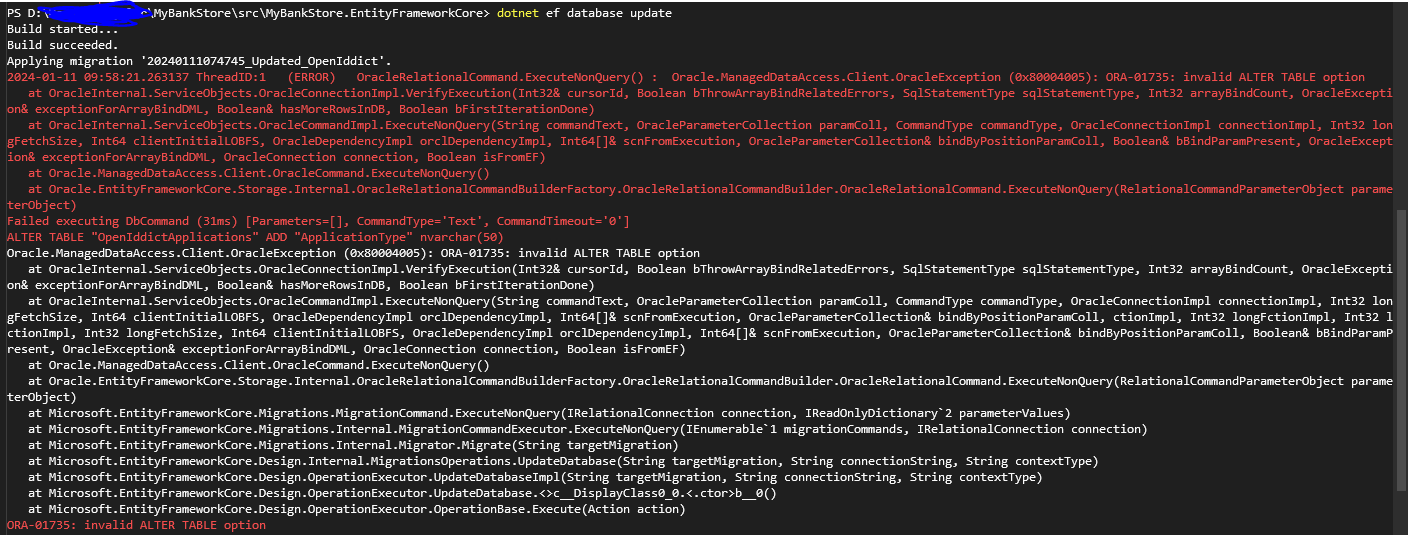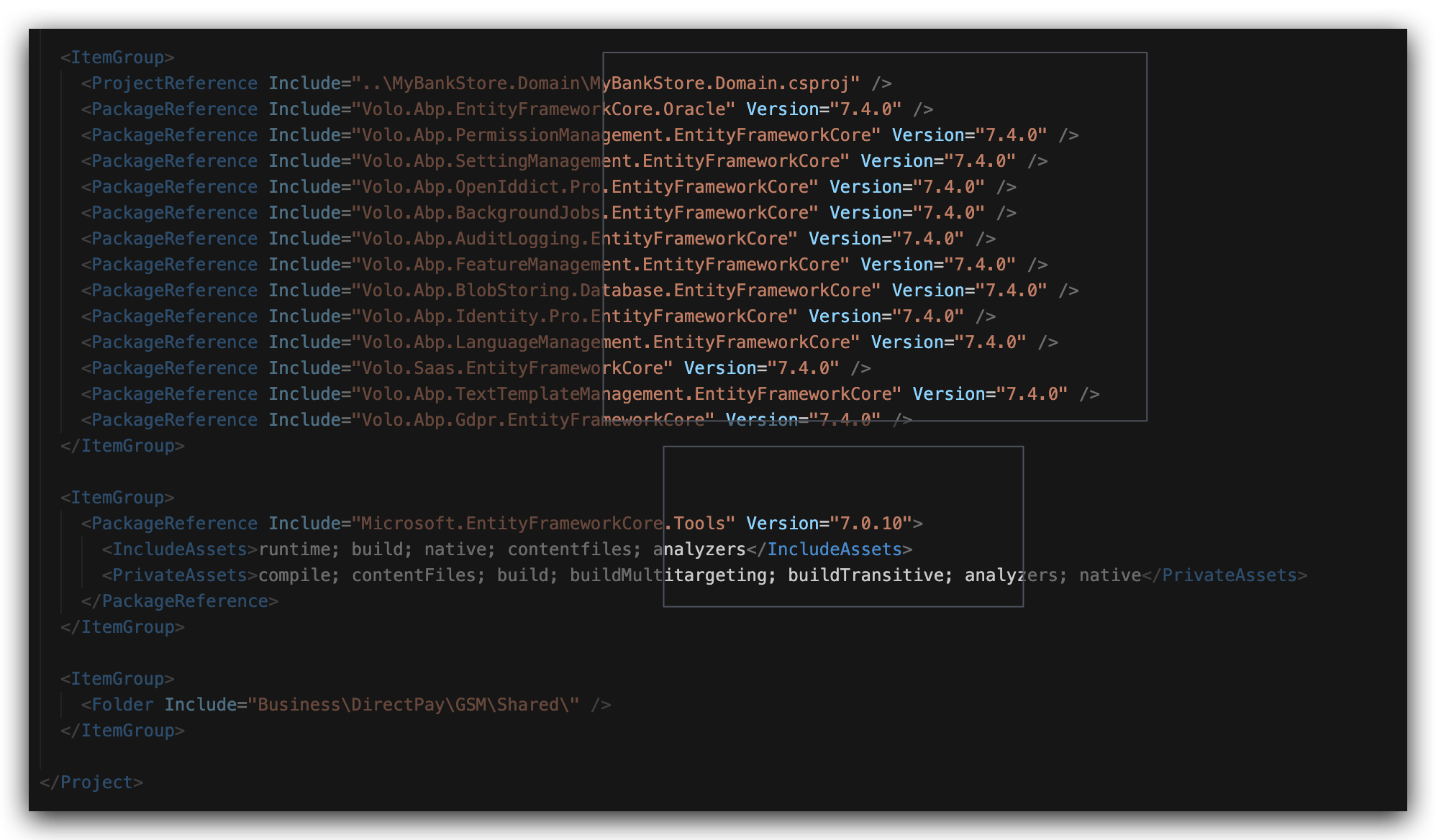Hello, I successfully moved my project from .net 7 to .net 8. My problem occurs while updating OpenIddict. When I run migrate, it gives me an error like this:
An exception occurred while iterating over the results of a query for context type 'Volo.Abp.OpenIddict.EntityFrameworkCore.OpenIddictProDbContext'.
Oracle.ManagedDataAccess.Client.OracleException (0x80004005): ORA-00904: "o"."ClientType": invalid identifier
at OracleInternal.ServiceObjects.OracleConnectionImpl.VerifyExecution(Int32& cursorId, Boolean bThrowArrayBindRelatedErrors, SqlStatementType sqlStatementType,
Int32 arrayBindCount, OracleException& exceptionForArrayBindDML, Boolean& hasMoreRowsInDB, Boolean bFirstIterationDone)
at OracleInternal.ServiceObjects.OracleCommandImpl.ExecuteReader(String commandText, OracleParameterCollection paramColl,
CommandType commandType, OracleConnectionImpl connectionImpl, OracleDataReaderImpl& rdrImpl, Int32 longFetchSize, Int64 clientInitialLOBFS,
OracleDependencyImpl orclDependencyImpl, Int64[] scnForExecution, Int64[]& scnFromExecution, OracleParameterCollection& bindByPositionParamColl,
Boolean& bBindParamPresent, Int64& internalInitialLOBFS, Int64 internalInitialJSONFS, OracleException& exceptionForArrayBindDML, OracleConnection
connection, IEnumerable`1 adrianParsedStmt, Boolean isDescribeOnly, Boolean isFromEF)
at Oracle.ManagedDataAccess.Client.OracleCommand.ExecuteReader(Boolean requery, Boolean fillRequest, CommandBehavior behavior)
at Oracle.ManagedDataAccess.Client.OracleCommand.ExecuteDbDataReader(CommandBehavior behavior)
at System.Data.Common.DbCommand.ExecuteDbDataReaderAsync(CommandBehavior behavior, CancellationToken cancellationToken)
--- End of stack trace from previous location ---
at Oracle.EntityFrameworkCore.Storage.Internal.OracleRelationalCommandBuilderFactory.OracleRelationalCommandBuilder.OracleRelationalCommand.ExecuteReaderAsync(RelationalCommandParameterObject parameterObject, CancellationToken cancellationToken)
at Oracle.EntityFrameworkCore.Storage.Internal.OracleRelationalCommandBuilderFactory.OracleRelationalCommandBuilder.OracleRelationalCommand.ExecuteReaderAsync(RelationalCommandParameterObject parameterObject, CancellationToken cancellationToken)
at Oracle.EntityFrameworkCore.Storage.Internal.OracleRelationalCommandBuilderFactory.OracleRelationalCommandBuilder.OracleRelationalCommand.ExecuteReaderAsync(RelationalCommandParameterObject parameterObject, CancellationToken cancellationToken)
at Microsoft.EntityFrameworkCore.Query.Internal.SplitQueryingEnumerable`1.AsyncEnumerator.InitializeReaderAsync(AsyncEnumerator enumerator, CancellationToken cancellationToken)
at Oracle.EntityFrameworkCore.Storage.Internal.OracleExecutionStrategy.ExecuteAsync[TState,TResult](TState state, Func`4 operation, Func`4 verifySucceeded, CancellationToken cancellationToken)
at Microsoft.EntityFrameworkCore.Query.Internal.SplitQueryingEnumerable`1.AsyncEnumerator.MoveNextAsync()
Oracle.ManagedDataAccess.Client.OracleException (0x80004005): ORA-00904: "o"."ClientType": invalid identifier
at OracleInternal.ServiceObjects.OracleConnectionImpl.VerifyExecution(Int32& cursorId, Boolean bThrowArrayBindRelatedErrors, SqlStatementType sqlStatementType, Int32 arrayBindCount,
OracleException& exceptionForArrayBindDML, Boolean& hasMoreRowsInDB, Boolean bFirstIterationDone)
at OracleInternal.ServiceObjects.OracleCommandImpl.ExecuteReader(String commandText, OracleParameterCollection paramColl, CommandType commandType, OracleConnectionImpl connectionImpl, OracleDataReaderImpl& rdrImpl, Int32 longFetchSize, Int64 clientInitialLOBFS, OracleDependencyImpl orclDependencyImpl, Int64[] scnForExecution, Int64[]& scnFromExecution, OracleParameterCollection& bindByPositionParamColl, Boolean& bBindParamPresent, Int64& internalInitialLOBFS, Int64 internalInitialJSONFS, OracleException& exceptionForArrayBindDML, OracleConnection connection, IEnumerable`1 adrianParsedStmt, Boolean isDescribeOnly, Boolean isFromEF)
at Oracle.ManagedDataAccess.Client.OracleCommand.ExecuteReader(Boolean requery, Boolean fillRequest, CommandBehavior behavior)
at Oracle.ManagedDataAccess.Client.OracleCommand.ExecuteDbDataReader(CommandBehavior behavior)
at System.Data.Common.DbCommand.ExecuteDbDataReaderAsync(CommandBehavior behavior, CancellationToken cancellationToken)
--- End of stack trace from previous location ---
at Oracle.EntityFrameworkCore.Storage.Internal.OracleRelationalCommandBuilderFactory.OracleRelationalCommandBuilder.OracleRelationalCommand.ExecuteReaderAsync(RelationalCommandParameterObject parameterObject, CancellationToken cancellationToken)
at Oracle.EntityFrameworkCore.Storage.Internal.OracleRelationalCommandBuilderFactory.OracleRelationalCommandBuilder.OracleRelationalCommand.ExecuteReaderAsync(RelationalCommandParameterObject parameterObject, CancellationToken cancellationToken)
at Oracle.EntityFrameworkCore.Storage.Internal.OracleRelationalCommandBuilderFactory.OracleRelationalCommandBuilder.OracleRelationalCommand.ExecuteReaderAsync(RelationalCommandParameterObject parameterObject, CancellationToken cancellationToken)
at Microsoft.EntityFrameworkCore.Query.Internal.SplitQueryingEnumerable`1.AsyncEnumerator.InitializeReaderAsync(AsyncEnumerator enumerator, CancellationToken cancellationToken)
at Oracle.EntityFrameworkCore.Storage.Internal.OracleExecutionStrategy.ExecuteAsync[TState,TResult](TState state, Func`4 operation, Func`4 verifySucceeded, CancellationToken cancellationToken)
at Microsoft.EntityFrameworkCore.Query.Internal.SplitQueryingEnumerable`1.AsyncEnumerator.MoveNextAsync()
at Microsoft.EntityFrameworkCore.Query.ShapedQueryCompilingExpressionVisitor.SingleOrDefaultAsync[TSource](IAsyncEnumerable`1 asyncEnumerable, CancellationToken cancellationToken)
at Microsoft.EntityFrameworkCore.Query.ShapedQueryCompilingExpressionVisitor.SingleOrDefaultAsync[TSource](IAsyncEnumerable`1 asyncEnumerable, CancellationToken cancellationToken)
at Volo.Abp.OpenIddict.Applications.EfCoreOpenIddictApplicationRepository.FindByClientIdAsync(String clientId, CancellationToken cancellationToken)
at Castle.DynamicProxy.AsyncInterceptorBase.ProceedAsynchronous[TResult](IInvocation invocation, IInvocationProceedInfo proceedInfo)
at Volo.Abp.Castle.DynamicProxy.CastleAbpMethodInvocationAdapterWithReturnValue`1.ProceedAsync()
at Volo.Abp.Uow.UnitOfWorkInterceptor.InterceptAsync(IAbpMethodInvocation invocation)
at Volo.Abp.Castle.DynamicProxy.CastleAsyncAbpInterceptorAdapter`1.InterceptAsync[TResult](IInvocation invocation, IInvocationProceedInfo proceedInfo, Func`3 proceed)
at MyBankStore.OpenIddict.OpenIddictDataSeedContributor.CreateApplicationAsync(String name, String type, String consentType, String displayName, String secret, List`1 grantTypes, List`1 scopes, String redirectUri, String postLogoutRedirectUri, List`1 permissions, String clientUri, String logoUri) in D:\\MyBankStore\src\MyBankStore.Domain\OpenIddict\OpenIddictDataSeedContributor.cs:line 344
Unhandled exception. at MyBankStore.OpenIddict.OpenIddictDataSeedContributor.CreateApplicationsAsync() in D:\\MyBankStore\src\MyBankStore.Domain\OpenIddict\OpenIddictDataSeedContributor.cs:line 90
at MyBankStore.OpenIddict.OpenIddictDataSeedContributor.SeedAsync(DataSeedContext context) in D:\\MyBankStore\src\MyBankStore.Domain\OpenIddict\OpenIddictDataSeedContributor.cs:line 56
at Castle.DynamicProxy.AsyncInterceptorBase.ProceedAsynchronous(IInvocation invocation, IInvocationProceedInfo proceedInfo)Oracle.ManagedDataAccess.Client.OracleException (0x80004005): ORA-00904: "o"."ClientType": invalid identifier
at OracleInternal.ServiceObjects.OracleConnectionImpl.VerifyExecution(Int32& cursorId, Boolean bThrowArrayBindRelatedErrors, SqlStatementType sqlStatementType, Int32 arrayBindCount, OracleException& exceptionForArrayBindDML, Boolean& hasMoreRowsInDB, Boolean bFirstIterationDone)
at OracleInternal.ServiceObjects.OracleCommandImpl.ExecuteReader(String commandText, OracleParameterCollection paramColl, CommandType commandType, OracleConnectionImpl connectionImpl, OracleDataReaderImpl& rdrImpl, Int32 longFetchSize, Int64 clientInitialLOBFS, OracleDependencyImpl orclDependencyImpl, Int64[] scnForExecution, Int64[]& scnFromExecution, OracleParameterCollection& bindByPositionParamColl, Boolean& bBindParamPresent, Int64& internalInitialLOBFS, Int64 internalInitialJSONFS, OracleException& exceptionForArrayBindDML, OracleConnection connection, IEnumerable`1 adrianParsedStmt, Boolean isDescribeOnly, Boolean isFromEF)
at Oracle.ManagedDataAccess.Client.OracleCommand.ExecuteReader(Boolean requery, Boolean fillRequest, CommandBehavior behavior)
at Oracle.ManagedDataAccess.Client.OracleCommand.ExecuteDbDataReader(CommandBehavior behavior)
at System.Data.Common.DbCommand.ExecuteDbDataReaderAsync(CommandBehavior behavior, CancellationToken cancellationToken)
--- End of stack trace from previous location ---
at Oracle.EntityFrameworkCore.Storage.Internal.OracleRelationalCommandBuilderFactory.OracleRelationalCommandBuilder.OracleRelationalCommand.ExecuteReaderAsync(RelationalCommandParameterObject parameterObject, CancellationToken cancellationToken)
at Oracle.EntityFrameworkCore.Storage.Internal.OracleRelationalCommandBuilderFactory.OracleRelationalCommandBuilder.OracleRelationalCommand.ExecuteReaderAsync(RelationalCommandParameterObject parameterObject, CancellationToken cancellationToken)
at Oracle.EntityFrameworkCore.Storage.Internal.OracleRelationalCommandBuilderFactory.OracleRelationalCommandBuilder.OracleRelationalCommand.ExecuteReaderAsync(RelationalCommandParameterObject parameterObject, CancellationToken cancellationToken)
at Microsoft.EntityFrameworkCore.Query.Internal.SplitQueryingEnumerable`1.AsyncEnumerator.InitializeReaderAsync(AsyncEnumerator enumerator, CancellationToken cancellationToken)
at Oracle.EntityFrameworkCore.Storage.Internal.OracleExecutionStrategy.ExecuteAsync[TState,TResult](TState state, Func`4 operation, Func`4 verifySucceeded, CancellationToken cancellationToken)
at Microsoft.EntityFrameworkCore.Query.Internal.SplitQueryingEnumerable`1.AsyncEnumerator.MoveNextAsync()
at Microsoft.EntityFrameworkCore.Query.ShapedQueryCompilingExpressionVisitor.SingleOrDefaultAsync[TSource](IAsyncEnumerable`1 asyncEnumerable, CancellationToken cancellationToken)
at Microsoft.EntityFrameworkCore.Query.ShapedQueryCompilingExpressionVisitor.SingleOrDefaultAsync[TSource](IAsyncEnumerable`1 asyncEnumerable, CancellationToken cancellationToken)
at Volo.Abp.OpenIddict.Applications.EfCoreOpenIddictApplicationRepository.FindByClientIdAsync(String clientId, CancellationToken cancellationToken)
at Castle.DynamicProxy.AsyncInterceptorBase.ProceedAsynchronous[TResult](IInvocation invocation, IInvocationProceedInfo proceedInfo)
at Volo.Abp.Castle.DynamicProxy.CastleAbpMethodInvocationAdapterWithReturnValue`1.ProceedAsync()
at Volo.Abp.Uow.UnitOfWorkInterceptor.InterceptAsync(IAbpMethodInvocation invocation)
at Volo.Abp.Castle.DynamicProxy.CastleAsyncAbpInterceptorAdapter`1.InterceptAsync[TResult](IInvocation invocation, IInvocationProceedInfo proceedInfo, Func`3 proceed)
at Volo.Abp.Castle.DynamicProxy.CastleAbpMethodInvocationAdapter.ProceedAsync()
at Volo.Abp.Uow.UnitOfWorkInterceptor.InterceptAsync(IAbpMethodInvocation invocation)
at Volo.Abp.Castle.DynamicProxy.CastleAsyncAbpInterceptorAdapter`1.InterceptAsync(IInvocation invocation, IInvocationProceedInfo proceedInfo, Func`3 proceed)
at Volo.Abp.Data.DataSeeder.SeedAsync(DataSeedContext context)
at Castle.DynamicProxy.AsyncInterceptorBase.ProceedAsynchronous(IInvocation invocation, IInvocationProceedInfo proceedInfo)
at Volo.Abp.Castle.DynamicProxy.CastleAbpMethodInvocationAdapter.ProceedAsync()
at Volo.Abp.Uow.UnitOfWorkInterceptor.InterceptAsync(IAbpMethodInvocation invocation)
at Volo.Abp.Castle.DynamicProxy.CastleAsyncAbpInterceptorAdapter`1.InterceptAsync(IInvocation invocation, IInvocationProceedInfo proceedInfo, Func`3 proceed) at Microsoft.Extensions.Hosting.Internal.Host.<StartAsync>b__15_1(IHostedService service, CancellationToken token) at Microsoft.Extensions.Hosting.Internal.Host.ForeachService[T](IEnumerable`1 services, CancellationToken token, Boolean concurrent, Boolean abortOnFirstException, List`1 exceptions, Func`3 operation) at Microsoft.Extensions.Hosting.Internal.Host.<StartAsync>g__LogAndRethrow|15_3(<>c__DisplayClass15_0&) at Microsoft.Extensions.Hosting.Internal.Host.StartAsync(CancellationToken cancellationToken) at Microsoft.Extensions.Hosting.HostingAbstractionsHostExtensions.RunAsync(IHost host, CancellationToken token) at Microsoft.Extensions.Hosting.HostingAbstractionsHostExtensions.RunAsync(IHost host, CancellationToken token)
at MyBankStore.DbMigrator.Program.Main(String[] args) in D:\\MyBankStore\src\MyBankStore.DbMigrator\Program.cs:line 28
at MyBankStore.DbMigrator.Program.<Main>(String[] args)
at Volo.Abp.Castle.DynamicProxy.CastleAbpMethodInvocationAdapter.ProceedAsync()
at Volo.Abp.Uow.UnitOfWorkInterceptor.InterceptAsync(IAbpMethodInvocation invocation)
at Volo.Abp.Castle.DynamicProxy.CastleAsyncAbpInterceptorAdapter`1.InterceptAsync(IInvocation invocation, IInvocationProceedInfo proceedInfo, Func`3 proceed)
at Volo.Abp.Data.DataSeeder.SeedAsync(DataSeedContext context)
at Castle.DynamicProxy.AsyncInterceptorBase.ProceedAsynchronous(IInvocation invocation, IInvocationProceedInfo proceedInfo)
at Volo.Abp.Castle.DynamicProxy.CastleAbpMethodInvocationAdapter.ProceedAsync()
at Volo.Abp.Uow.UnitOfWorkInterceptor.InterceptAsync(IAbpMethodInvocation invocation)
I updated all my packages via Suite and such a problem occurs.
I am trying to migrate in the link https://docs.abp.io/en/abp/8.0/Migration-Guides/OpenIddict4-to-5#openiddictapplicationmodel-changes We work in Oracle database. Could there be a problem with Volo.Abp.OpenIddict.Pro Version="8.0.1"?
- ABP Framework version: v8.0.1
- UI Type: MVC
- Database System: Oracle
- Tiered (for MVC) or Auth Server Separated (for Angular): Tiered
16 Answer(s)
-
0
hi
Did you add the new ef core migrations? Can you share the migration file?
btw, It seems the
Oracledidn't support ef core 8. -
0
Yes i added new migration :
using System; using Microsoft.EntityFrameworkCore.Migrations; #nullable disable namespace MyBankStore.Migrations { /// <inheritdoc /> public partial class Updated_OpenIddict : Migration { /// <inheritdoc /> protected override void Up(MigrationBuilder migrationBuilder) { migrationBuilder.RenameColumn( name: "Type", table: "OpenIddictApplications", newName: "ClientType"); migrationBuilder.AddColumn<string>( name: "ApplicationType", table: "OpenIddictApplications", type: "nvarchar(50)", maxLength: 50, nullable: true); migrationBuilder.AddColumn<string>( name: "JsonWebKeySet", table: "OpenIddictApplications", type: "nvarchar(max)", nullable: true); migrationBuilder.AddColumn<string>( name: "Settings", table: "OpenIddictApplications", type: "nvarchar(max)", nullable: true); } /// <inheritdoc /> protected override void Down(MigrationBuilder migrationBuilder) { migrationBuilder.DropColumn( name: "ApplicationType", table: "OpenIddictApplications"); migrationBuilder.DropColumn( name: "JsonWebKeySet", table: "OpenIddictApplications"); migrationBuilder.DropColumn( name: "Settings", table: "OpenIddictApplications"); migrationBuilder.RenameColumn( name: "ClientType", table: "OpenIddictApplications", newName: "Type"); } } }I changed this part as well
var application = new AbpApplicationDescriptor { ClientId = name, ClientType = type, ClientSecret = secret, ConsentType = consentType, DisplayName = displayName, ClientUri = clientUri, LogoUri = logoUri, }; -
0
hi
The migration file looks no problem,
I'm sure you have
update databasewith the migration file.Please check the table columns in the database.
-
0
What does update database mean? I add this file myself and i didnt change anything else. While developing in .net7, we were using abp 7 version. And the migration was working without any problems. With my migration to abp 8, I added only the migration file I sent you for openIddict to the Migrations folder. and now when it goes to the migration seed data section it gives me the error I got.
-
0
hi
You need to update your database with your migrations.
You should use
dotnet ef migrations add Updated_OpenIddictcommand to add new migrations instead of copy the code from https://docs.abp.io/en/abp/8.0/Migration-Guides/OpenIddict4-to-5#openiddictapplicationmodel-changesAfter creating new migrations you can use
dotnet ef database updateto update the database.https://learn.microsoft.com/en-us/ef/core/managing-schemas/migrations/applying?tabs=dotnet-core-cli
-
0
-
0
hi
It seems your ef core migration files are not generated by Oracle provider.
Please check it and make sure your db provider is Oracle.
-
0
-
0
hi
Can you share a project?
liming.ma@volosoft.com
-
0
Which part do you want me to share with you?
-
0
hi
Can you share an entire project?
or the ef core project
MyCompanyName.MyProjectName.EntityFrameworkCore -
0
-
0
Since OpenIddict was not migrated automatically, we had to downgrade the project. As I explained in the e-mail, we have to continue writing code. The problem is, when I create the migration file I sent you above by adding and updating it as in the link you sent, we try it on the test database. and it gives the error I sent above.
-
0
hi
Sorry, I missed your messages.
Can you find a way to reproduce this problem in a project?
-
0
Hi, I solved my problem. Here I would like to write an explanation for people who may encounter the same problem. First make sure you have successfully upgraded all your project's nuget packages. Some nuget packages may need to remain in the same version, depending on your project. For example, in my case, since .net 8 was not supported, the System.ServiceModel nuget packages had to remain in version 4.4.*. This may be another nuget package or another version in your project. var application = new AbpApplicationDescriptor { ClientId = name, ClientType = type, ClientSecret = secret, ConsentType = consentType, DisplayName = displayName, ClientUri = clientUri, LogoUri = logoUri, }; Don't forget to change Type to ClientType.
After checking these, make sure that the project is built successfully. Run "dotnet ef migrations add Updated_OpenIddict" in the EntityFrameworkCore project. In this way, you will migrate the necessary entity changes to your project. Finally, if DbMigrator gives an error due to old settings, run the "dotnet ef database update" code in your EntityFrameworkCore project.
-
0
Thanks.


